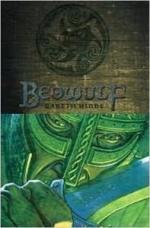Another
great building to fully make ready,
A
hall and a high-seat, that half they might rule with
The
sons of the Jutemen, and that Folcwalda’s son
would
Day
after day the Danemen honor
40 When
gifts were giving, and grant of his ring-store
To
Hengest’s earl-troop ever so freely,
Of
his gold-plated jewels, as he encouraged the Frisians
{Equality of gifts agreed on.}
On
the bench of the beer-hall. On both sides they
swore then
A
fast-binding compact; Finn unto Hengest
45 With
no thought of revoking vowed then most solemnly
The
woe-begone remnant well to take charge of,
His
Witan advising; the agreement should no one
By
words or works weaken and shatter,
By
artifice ever injure its value,
50 Though
reaved of their ruler their ring-giver’s slayer
They
followed as vassals, Fate so requiring:
{No one shall refer to old grudges.}
Then
if one of the Frisians the quarrel should speak of
In
tones that were taunting, terrible edges
Should
cut in requital. Accomplished the oath was,
55 And treasure
of gold from the hoard was uplifted.
{Danish warriors are burned on a funeral-pyre.}
The
best of the Scylding braves was then fully
Prepared
for the pile; at the pyre was seen clearly
The
blood-gory burnie, the boar with his gilding,
The
iron-hard swine, athelings many
60 Fatally
wounded; no few had been slaughtered.
Hildeburg
bade then, at the burning of Hnaef,
[39]
{Queen Hildeburg has her son burnt along with Hnaef.}
The
bairn of her bosom to bear to the fire,
That
his body be burned and borne to the pyre.
The
woe-stricken woman wept on his shoulder,[2]
65 In measures
lamented; upmounted the hero.[3]
The
greatest of dead-fires curled to the welkin,
On
the hill’s-front crackled; heads were a-melting,
Wound-doors
bursting, while the blood was a-coursing
From
body-bite fierce. The fire devoured them,
70 Greediest
of spirits, whom war had offcarried
From
both of the peoples; their bravest were fallen.
[1] For 1084, R. suggests
’wiht Hengeste wieth gefeohtan.’—K.
suggests
‘wieth Hengeste wiht
gefeohtan.’ Neither emendation would make
any
essential change in the translation.
[2] The separation of adjective and noun by a phrase (cf. v. 1118) being very unusual, some scholars have put ‘earme on eaxle’ with the foregoing lines, inserting a semicolon after ‘eaxle.’ In this case ’on eaxe’ (i.e., on the ashes, cinders) is sometimes read, and this affords a parallel to ‘on bael.’ Let us hope that a satisfactory rendering shall yet be reached without resorting to any tampering with the text, such as Lichtenheld proposed: ’earme ides on eaxle gnornode.’
[3] For ‘gueth-rinc,’ ‘gueth-rec,’ battle-smoke, has been suggested.




